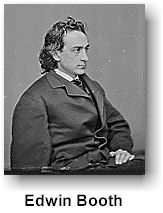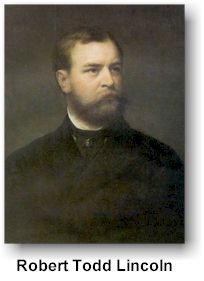BOOTH
AND LINCOLN
(Unknown source; found on the Internet)
I am uncertain as to the truth of this story, sent to me by my son Ulysses Begone while in college. Doing a sanity check through some urban legends pages turns up nothing that refutes it. If anybody knows definitively whether or not this incident really happened, please contact me. In all my Civil War readings I have never stumbled across this story! - Jonah

One
brother kills the president; the other saves the president's son.
One
of the great actors of his day stands on a station platform in Jersey City
waiting to board a train.
The
coach he is about to get into… starts with a jolt; he sees a young man lose his
balance, falling between the platform and the moving train.
Quickly,
the actor reaches down, grabs the young man by the collar and pulls him to
safety. It is only years later that they recognize the haunting irony.
The
actor is Edwin Booth… brother of John Wilkes Booth.
And
the young man he saved?
Robert Todd Lincoln—Abraham Lincoln's son.
From http://www.near-death.com/experiences/reincarnation07.html
Another strange karmic connection
having to do with President Lincoln is the fact that Edwin Booth [John Wilkes'
brother] once saved the life of Robert Lincoln [the President's son] on a train
platform in Jersey City at the beginning of the Civil War. Because of this,
Edwin Booth was invited to give a command performance in the White House and
forever after was a Lincoln sympathizer, even though he had been raised in the
South.
From http://www.sermonillustrator.org/illustrator/edwin_thomas.htm
Meet Edwin Thomas, a master of the stage. During the latter half of the
1800s, this small man with the huge voice had few rivals. Debuting in Richard
III at the age of fifteen, he quickly established himself as a premier Shakespearean
actor. In New York he performed Hamlet for one hundred consecutive
nights. In London he won the approval of the tough British critics. When it
came to tragedy on the stage, Edwin Thomas was in a select group.

When it came to tragedy in life, the same could be said as well. Edwin had
two brothers, John and Junius. Both were actors, although neither rose to his
stature. In 1863, the three siblings united their talents to perform Julius Caesar.
The fact that Edwin's brother John took the role of Brutus was an eerie
harbinger of what awaited the brothers-and the nation-two years hence.
For this John who played the assassin in Julius Caesar is the same
John who took the role of assassin in Ford's Theatre. On a crisp April night in
1865, he stole quietly into the rear of a box in the Washington theater and
fired a bullet at the head of Abraham
Lincoln. Yes, the last name of the brothers was Booth--Edwin Thomas Booth
and John Wilkes Booth.
Edwin was never the same after that night. Shame from his brother's crime
drove him into retirement. He might never have returned to the stage had it not
been for a twist of fate at a New Jersey train station. Edwin was awaiting his
coach when a well dressed young man, pressed by the crowd, lost his footing and
fell between the platform and a moving train. Without hesitation, Edwin locked
a leg around a railing, grabbed the man, and pulled him to safety. After the
sighs of relief, the young man recognized the famous Edwin Booth.
Edwin, however, didn't recognize the young man he'd rescued. That knowledge
came weeks later in a letter, a letter he carried in his pocket to the grave. A
letter from General Adams Budeau, chief secretary to General Ulysses S. Grant.
A letter thanking Edwin Booth for saving the life of the child of an American
hero, Abraham Lincoln. How ironic that while one brother killed the president,
the other brother saved the president's son. The boy Edwin Booth yanked to
safety? Robert Todd Lincoln.
From an Internet correspondant...
Cruising the web, researching Edwin Booth, my mouse fell upon your site, and your question about the source of the story of how Edwin unwittingly saved Robert Todd Lincoln.
In "The Mad Booths of Maryland" (1940), the author, Stanley Kimmel, retells the story which he attributes to an article by Robert Lincoln which appeared in "The Century Magazine", April 1909.
Then, in Eleanor Ruggles' book, "Prince of Players" (1953), a version of the story is told by Adam Badeau which more resembles the form of the story you include on your webpage. If memory serves me right, Adam had a military connection with the White House at the time, and may have heard the story from Robert Todd himself.
Then, again, in Richard Lockridge's "Darling of Misfortune" (1932), there is the briefest of mention of the story, saying only the Edwin saved the son of the man who his brother John would later kill.
What I find odd is that Asia Booth Clarke, Edwin's sister, makes no reference to the story at all in her biography of her brother which she wrote as part of a series of bios on great American actors. It may be that Edwin never told her the story, or that she decided not to include it as a snub for the treatment the family underwent following the assassination. Whereas Edwin may have been respected and allowed to remain at house arrest, the rest of the family fared worse. The older brother, June, and Asia's husband spent almost a month in a jail cell. And, while Edwin may have been content with house arrest, the rest of the family was not. Especially when they were all confined in their mother's home in NYC. The Booths were not a small family.
This has been a rather long answer, with a few extra bits thrown in. Hope they help. I, myself, am searching for a copy of the article from The Century Magazine. I want to include some of the text in my play that I am writing about Edwin's life.
If you have any leads on anything else that has connection to Edwin, I would be more than happy to learn of them.
I will visit your website every so often to see if there's anything new.
Have a good life,
Bert
There's a good article about this tale on Historynet.com: How Booth Saved Lincoln's Life
